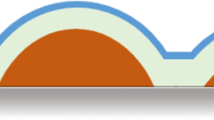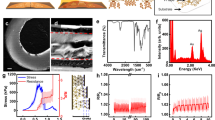Abstract
IT has been shown by Zipper et al.1 that a plastic T-shaped intrauterine device is much more effective in preventing pregnancies in women if its stem is encased by copper wire. After removal of the copper intrauterine device from the human uterus, the copper wire is blackish and weighs less than at the time of insertion; a device with a 200 cm2 copper surface loses 60 µg per day of usage (personal communication from H. J. Tatum).
This is a preview of subscription content, access via your institution
Access options
Subscribe to this journal
Receive 51 print issues and online access
$199.00 per year
only $3.90 per issue
Buy this article
- Purchase on Springer Link
- Instant access to full article PDF
Prices may be subject to local taxes which are calculated during checkout
Similar content being viewed by others
References
Zipper, J. A., Tatum, H. J., Pastene, L., Medel, M., and Rivera, M., Amer. J. Obstet. Gynec., 105, 1274 (1969).
Author information
Authors and Affiliations
Rights and permissions
About this article
Cite this article
OSTER, G. Reaction of Metallic Copper with Biological Substrates. Nature 234, 153–154 (1971). https://doi.org/10.1038/234153a0
Issue Date:
DOI: https://doi.org/10.1038/234153a0
This article is cited by
-
In vitro assessment of the toxicity of metal compounds
Biological Trace Element Research (1984)
-
Anti-inflammatory properties of copper implants in the rat paw edema: A preliminary study
Agents and Actions (1981)
-
Effect of copper intrauterine contraceptive device on carbohydrate metabolism in rat endometrium
Journal of Biosciences (1980)
-
Carcinofetale Antigene
Klinische Wochenschrift (1975)
-
Application of Statistics to Results in Gamma Ray Astronomy
Nature (1973)
Comments
By submitting a comment you agree to abide by our Terms and Community Guidelines. If you find something abusive or that does not comply with our terms or guidelines please flag it as inappropriate.



